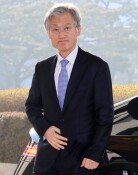South Korea, Japan deepen ties amid global tensions
South Korea, Japan deepen ties amid global tensions
Posted June. 19, 2025 07:29,
Updated June. 19, 2025 07:29
South Korean President Lee Jae-myung met with Japanese Prime Minister Shigeru Ishiba on the sidelines of the G7 Summit in Canada on Tuesday, calling the two countries “neighbors sharing a front yard” and pledging to strengthen bilateral cooperation. Ishiba, noting that this year marks the 60th anniversary of normalized diplomatic relations, responded with a commitment to regular and close dialogue. According to the South Korean presidential office, the two leaders agreed to address historical disputes and pursue a future-oriented relationship.
Their meeting marked the first official encounter since President Lee took office and signaled a promising step toward continuity and stability in bilateral relations. In the past, ties between Seoul and Tokyo often experienced disruption and policy shifts with each new administration. Despite his criticism of the previous government's third-party compensation plan for wartime forced labor victims, Lee has opted for a consistent approach to managing relations with Japan.
The need for close cooperation has grown amid shifting global dynamics. Both leaders acknowledged increasing challenges in international trade and diplomacy, with Ishiba emphasizing the importance of complementary cooperation.
North Korea's deepening military alliance with Russia has further heightened regional concerns. In addition to sending over 10,000 troops to support the war in Ukraine, Pyongyang is dispatching 6,000 more military engineers and construction personnel. In exchange, North Korea is expected to receive critical supplies including food, oil and advanced weapons technology, posing a growing threat to its neighbors. These developments underscore the need for stronger trilateral coordination among South Korea, Japan and the United States.
Seoul and Tokyo must also prepare for uncertainties stemming from the potential return of the Trump administration. This includes managing high tariffs and the possibility of a limited U.S.-North Korea deal centered on intercontinental ballistic missiles. While reinforcing trilateral security ties with Washington, the two countries must also develop joint strategies to address unpredictable policy shifts under a second Trump presidency.





![[천광암 칼럼]장동혁은 대체 왜 이럴까](https://dimg.donga.com/c/138/175/90/1/wps/NEWS/IMAGE/2026/02/22/133399127.1.jpg)

